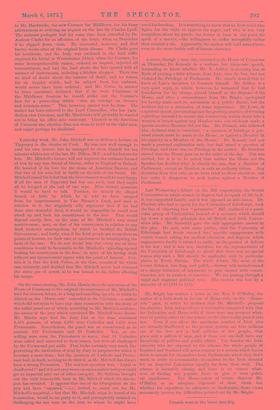On the same evening, Mr. John Martin drew the attention
of the House of Commons to the original circumstances of Mr. Mitchell's trial for treason-felony, in a long and rambling speech, in which he dilated on the ' Home-rule' conceded to the Colonies,—a•matter which did not seem to have any clear connection with the story of the unfair panel out of which, according to Mr. Martin's evidence, the names of the jury which convicted Mr. Mitchell were drawn. Mr. Martin says that the Jury List at the time contained 4,570 persons, of whom 2,935 were Catholics and 1,635 were Protestants. Nevertheless, the panel was so constructed as to contain 122 Protestants and 28 Catholics. Yet, so un- willing were even the Protestants to serve, that 19 Catholics were called and answered to their names, but were all challenged by the Crown and put aside. That looks certainly very much like perverting the institution of trial by Jury to purposes for which it becomes a mere sham ; but the question of Catholic and Protes- tant had, in itself, nothing to do with it, as Mr. Mitchell has always been a strong Protestant. The real test-question was, "Loyal or disaffected ?" and it is not easy to see on such a matter howyou could get an impartial jury out of either category. Mr. Sullivan brought out the only honourable trait in Mr. Mitchell which the discus- sion has revealed. It appears that one of the Orangemen on the jury had been "squared,"—i.e., bribed to stand out for Mr. Mitchell's acquittal,—but that Mr. Mitchell, when he heard of the transaction, would be no party to it, and peremptorily insisted on challenging the one man on the jury to whom he might have owed his freedom. It is something to know that an Irish rebel who fights for the right to oppress the negro, and who is not very scrupulous about his parole, has shown at least in one point the spirit of a martyr,—the willingness to suffer wrongfully rather than commit a sin. Apparently, the anchor will hold somewhere, even in the most friable soil of human character.


































 Previous page
Previous page